Some would say that 2024 was one of the most tumultuous years for SEO to date, with major algorithm updates and the proliferation of AI reshuffling the SERPs in many different ways.
Although the dust has settled a bit on some of these shake-ups (for now), SEO is poised to continue evolving at a record pace in the new year, and local businesses and SEO professionals alike will need to adapt to stay competitive.
While some foundational principles are sure to remain the same for SEO in 2025 and beyond, new technology trends and shifts in user behavior and preferences, driven in no small part by AI, will require businesses and SEOs to implement fresh tactics if they hope to climb the rankings this year.
To help you get a head start on your 2025 SEO strategy, we've put together this article going over some of our predictions for the top ranking factors and tactics for optimizing your local search presence going forward.
What Will the Top Ranking Factors Be for Local SEO in 2025?
The SEO playbook has been dramatically rewritten in the past year, with AI and quality-focused algorithm updates transforming how local businesses compete for online visibility. Listings now need to be more optimized, content more helpful, and websites more user friendly.
Additionally, tracking performance in traditional local search results will need to be supplemented with additional visibility tracking. For example, you may want to track your AI Overview appearances to get a complete picture of your local search visibility.
In 2025, SEO tactics that game the system will continue to offer diminishing returns, and businesses will instead need to focus their efforts on creating a genuinely authoritative and trustworthy online presence that speaks directly to both search engines and potential customers.
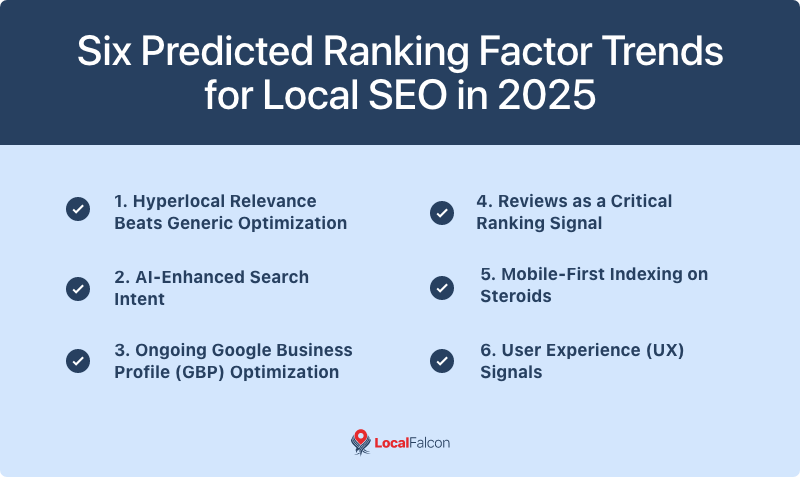
Six Predicted Ranking Factor Trends for Local SEO in 2025:
- Hyperlocal Relevance Beats Generic Optimization: Gone are the days of one-size-fits-all local SEO strategies. Google's algorithms now take a granular approach to local search, rewarding businesses that demonstrate deep, authentic community connections at a hyperlocal level.
- AI-Enhanced Search Intent: Machine learning has transformed search from keyword matching to true intent understanding. Your content must now anticipate and precisely address the nuanced needs behind local intent search queries, going beyond providing surface-level information to truly address these user needs.
- Ongoing Google Business Profile (GBP) Optimization: Your GBP is no longer just a static digital business card. It's a dynamic, living representation of your brand that requires constant optimization and strategic management to drive engagement and generate leads. With new features like AI-generated business descriptions popping up, it's more important than ever for businesses to keep their GBP listings polished and accurate.
- Reviews as a Critical Ranking Signal: As a direct ranking factor related to prominence, reviews have become more influential than ever in local SEO. Search engines now use review quantity, quality, recency, and other review-related signals as key ranking factors. Because of this, sentiment analysis will also be essential to 2025 SEO strategies.
- Mobile-First Indexing on Steroids: Mobile optimization for SEO in 2025 requires more than simple responsive design. It demands lightning-fast load times, intuitive navigation, and content specifically tailored for on-the-go users.
- User Experience (UX) Signals: Search engines are now so sophisticated that they can practically feel the user's journey, and UX-related metrics like bounce rates, engagement depth, and interaction quality are now crucial ranking factors for local business sites.
Tactics To Improve Rankings and Master Local SEO in 2025
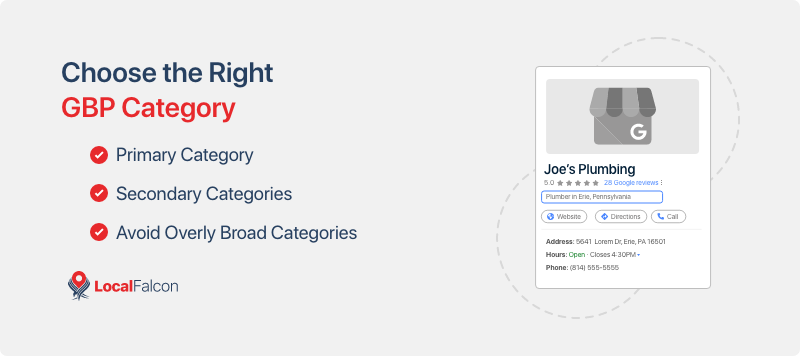
Choose the Right GBP Category
Your Google Business Profile category is not just a small detail; it's the number one ranking factor for your Google Search and Maps business listing. Here's how to nail your GBP category selection:
- Primary Category: Select the single most relevant category that precisely describes your core business. This should be the most accurate representation of what you do.
- Secondary Categories: Try to add at least 2-3 other, more specific categories that provide a nuanced view of your business offerings.
- Avoid Overly Broad Categories: Don't choose generic categories (you don't need to select "restaurant" if you already selected "Chinese restaurant"). The more specific and accurate, the better your chances of ranking for relevant local searches.
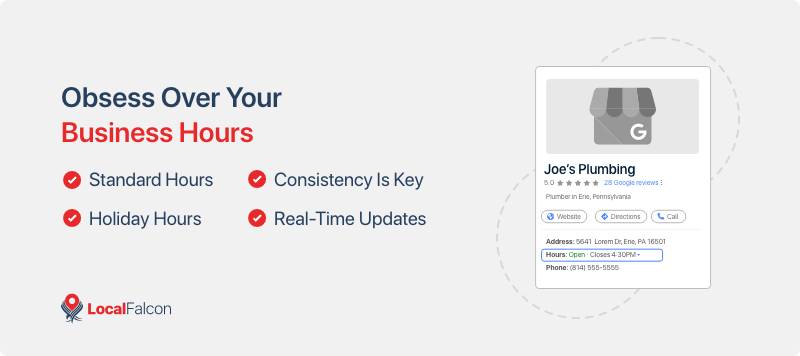
Obsess Over Your Business Hours
Accuracy in business hours might seem trivial, but it's crucial for local SEO and customer trust. Here are some tips for ensuring your hours are helping you rank better in 2025:
- Standard Hours: Ensure your regular business hours are 100% accurate across all platforms.
- Holiday Hours: Make sure to update special hours for holidays, seasonal changes, or unexpected closures.
- Consistency Is Key: Match your hours across Google Business Profile, your website, social media, and other online directories.
- Real-Time Updates: Consider using tools or services that can help you manage and sync your business hours automatically.
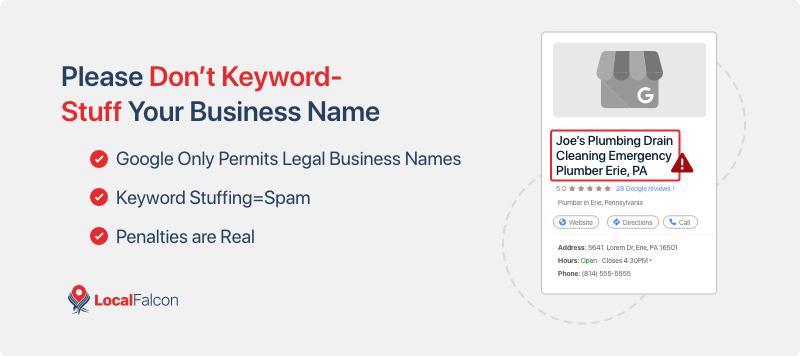
Please Don't Keyword-Stuff Your Business Name
Your business name is a powerful ranking signal and, for better or worse, including keywords in your business name can actually help your GBP rank higher on Google. That being said, please don't spam keywords in your business name. Here's why not:
- Google Only Permits Legal Business Names: Google's guidelines only allow you to use your registered business name, as it appears on official documents and signage, with no exceptions.
- Keyword Stuffing=Spam: Do not add keywords, service types, or location names to your business name to artificially manipulate rankings, as this violates Google's anti-spam policies.
- Penalties Are Real: Google actively penalizes businesses that engage in name manipulation, which can result in reduced visibility or profile suspension.
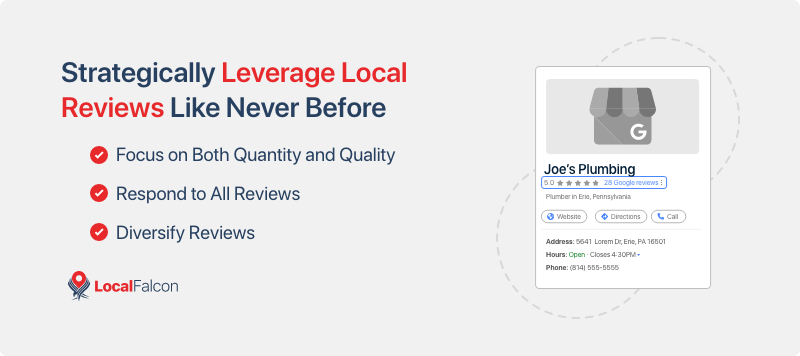
Strategically Leverage Local Reviews Like Never Before
As we mentioned earlier, reviews are more than just social proof; they're a significant ranking factor for SEO in 2025, with Google reviews being one of the most important ranking factors for local SEO. Here's how to use reviews to your advantage:
- Focus on Both Quantity and Quality: Encourage genuine, detailed reviews from real customers (providing a Google review link can help here).
- Respond to All Reviews: Engage with both positive and negative feedback professionally. This can improve engagement signals for your GBP and potentially even turn a negative review into a positive one.
- Diversify Reviews: Although Google reviews are the most important, you should also aim to collect reviews across other relevant platforms, such as Yelp, Tripadvisor, and industry-specific directories and review sites.
- Optimize Your Review Signals with AI Analysis: Use AI to analyze sentiment across reviews and identify ways to improve business performance and reputation.

Create Locally Relevant Content with a Passion
Content that speaks directly to your local audience can significantly boost your SEO in 2025, helping pages on your site appear in more organic search results. Here are some things to remember when creating locally relevant content:
- Include Local Keywords Naturally: Do keyword research to identify localized search terms to target and Incorporate these location-specific keywords naturally into content.
- Write About Local Events and News: Create content that demonstrates your connection to the local community.
- Provide Neighborhood-Specific Information: Share insights, guides, or resources unique to your local area to drive hyperlocal traffic.
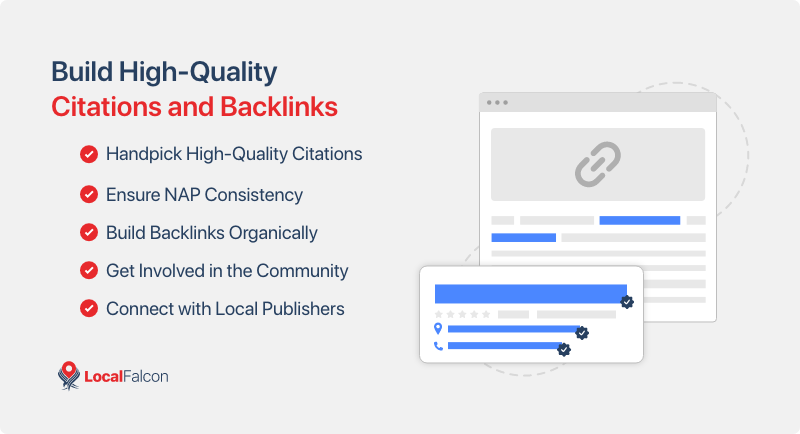
Build High-Quality Citations and Backlinks
Citation and backlink strategies for SEO in 2025 demand a strategic, quality-focused approach. Gone are the days when you could simply spam citations and backlinks to build authority and increase rankings. Here's how to take a modern approach to building citations and backlinks:
- Handpick High-Quality Citations: Prioritize authoritative, locally-relevant directories and niche industry listings.
- Ensure NAP Consistency: Consistency in Name, Address, and Phone (NAP) information across all platforms is still important.
- Build Backlinks Organically: Build local content marketing strategies and partnerships that naturally attract high-quality backlinks, rather than purchasing lots of low-quality ones.
- Get Involved in the Community: Actively participate in community events, local business associations, and chamber of commerce.
- Connect with Local Publishers: Try to forge genuine relationships with local media and industry publications to get featured articles on their sites.
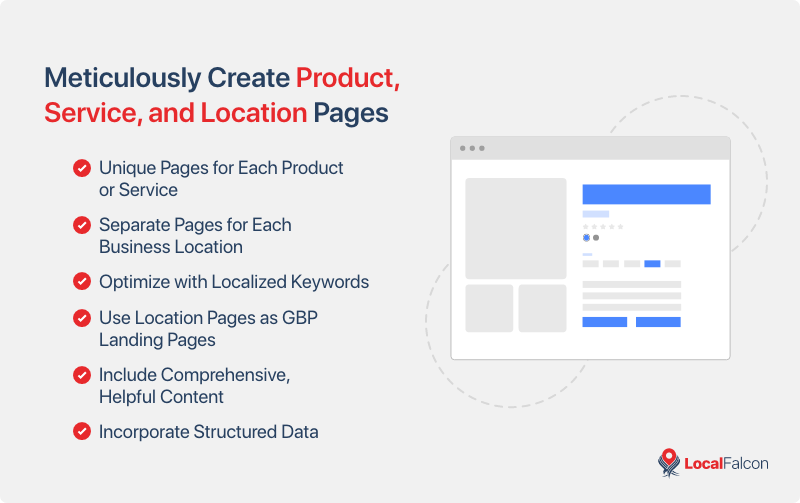
Meticulously Create Product, Service, and Location Pages
Any local business's website should have a unique page for every single category of product or service they offer. Additionally, multi-location businesses should have a unique page for each location. All of these pages provide prime opportunities to include localized keywords in content, plus location pages can be used as landing pages for Google Business Profile and other directory listings to improve relevance. Here's what you need to remember when doing this:
- Unique Pages for Each Product or Service: Ensure every distinct product or service your business offers has a dedicated page to maximize keyword targeting and relevance.
- Separate Pages for Each Business Location: For multi-location businesses, create a unique page for each physical location to improve local search visibility and tailor content to specific areas.
- Optimize with Localized Keywords: Use keywords relevant to your products, services, and the specific geographic areas you serve naturally within the content.
- Use Location Pages as GBP Landing Pages: Link each location's GBP directly to its corresponding location page on your site to enhance relevance and user experience.
- Include Comprehensive, Helpful Content: Detail offerings with clear descriptions, FAQs, pricing, and other valuable information to improve user engagement.
- Incorporate Structured Data: Add schema markup for products, services, and locations to help search engines better understand and display your content in local search results.
Conclusion
In 2025, SEO for businesses is about being authentically local, technologically savvy, and genuinely helpful to your community; remember that the best SEO strategy is one that genuinely serves your audience's needs.
By focusing on monitoring these ranking factors and implementing these tactics, local businesses can improve their online visibility and connect more effectively with potential customers for the year to come and beyond!


